Research and Publications
Research and Publications
Publications
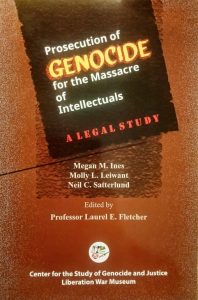
Prosecution of Genocide for the Massacre of Intellectuals: A Legal Study
Persuant to the International Crimes (Tribunals) Act 1973 consistent with International Criminal Law
Megan M Ines, Molly L Leiwant& Neil C. Satterlund under the supervision of Professor Laurel E. Fletcher
ISBN: 978-984-90207-4-5
Published in June 2021 by the Center for the Study of Genocide and Justice
Price: BDT 200.00
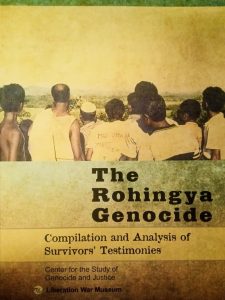
The Rohingya Genocide: Compilation and Analysis of Survivors Testimonies
Edited by: MofidulHoque
Co-edited by: Emraan Azad, ShaoliDasgupta and Naureen Rahim
ISBN: 978-984-90207-1-4
Published in September 2018 by the Center for the Study of Genocide and Justice
Second Printing: January 2019
Price: BDT 500.00
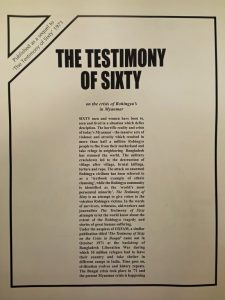
The Testimony of Sixty
On the crisis of Rohingyas in Myanmar
Published in October 2017 by the Center for the Study of Genocide and Justice
Published as a sequel to the ‘Testimony of Sixty’ 1971
Price: BDT 200.00
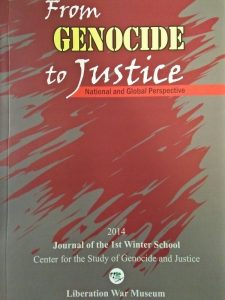
From Genocide to Justice: National and Global Perspective
Journal of the 1st Winter School
ISBN: 978-984-90206-6-0
Published in: 2014
Third Printing: December 2016
Price: Tk.350
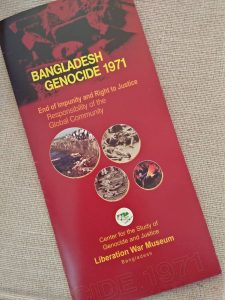
Bangladesh Genocide 1971 (Booklet)
End of Impunity and Right to Justice
Responsibility of the Global Community
Research Projects
CSGJ Junior Research Fellowship Programme
From 2020, each year the Center for the Study of Genocide and Justice has been organizing Junior Research Fellowship Programme, especially designed for the university students and early career researchers. This is a four-months fellowship programme where JuniorResearch Fellows initiate research projects on the history of the Liberation War and its various aspects and legal interpretation, such as Genocide, War Crimes and Crime against humanity etc. Young professionals, researchers and volunteers of CSGJ who have been studying in different public and private universities present their research papers through the fellowship programme. Every researcher conducts the research under the company of a mentor in each project. After submitting the final paper, a separate reviewer’s opinion was received through online defense.
In this background, the CSGJ invites proposal from Bangladeshi young students and researchers in order to conduct research and to write a full-paper outlining, among others, research background, objectives, methodology, major findings and concrete policy reforms (if needed) for a future publication.
Areas of Research
Priority areas under for this Fellowship may include, but are not limited to:
• Oral History Programme of Liberation War Museum
• Genocide Trial in Bangladesh: Evaluation of International Crimes Tribunal and Its Judicial Decisions
• Transitional Justice for the Victims of 1971’s Bangladesh Genocide
• Justice for the Victims of Sexual Violence of 1971
• Comparative Study on Genocide and Justice
• Memorialising History and Past Crimes: Memorial Sites relating to 1971’s Genocide in Context
• 1971’s History in Textbooks and the Necessity of Peace Education for Inclusive Society
• Creating Safe Cyberspace including ‘Social Media’ to Confront Hate Crimes
• Art and Culture towards creating a Peaceful Society
• Interpreting Religion through a Humanist Approach
Eligibility of the Candidates
Two categories of applicants are eligible for the Fellowship:
a) Fresh graduates and post-graduate students of any discipline
b) Early career researchers/teachers who are just within three years of their career.
The students must be in Bangladesh during their Fellowship.
Submission of Proposal and Selection Process
Applications along with short proposal of 1000-1500 words submitted by an individual or a group of two individuals will be accepted for further review. Both the individual and group are thus encouraged to apply. The proposal must include, among others, a research background/statement of problem, research objectives and questions, methodology, literature review, possible outcomes/findings, and a bibliography.
The selection is made through a rigorous competitive process by engaging university professors and genocide study researchers. The Fellowship funding will be discussed and fixed depending on the quality of proposal and possible scholarly impact of the research.
In 2020, 11 research projects and in 2021, 09 research projects have been submitted through this programme. Selected papers are offered for publication by the Center.
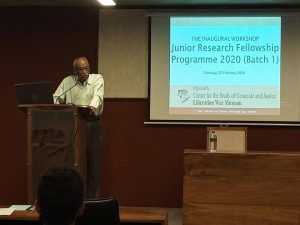 |
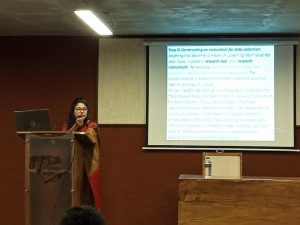 |
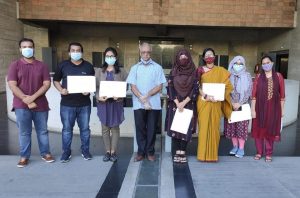 |
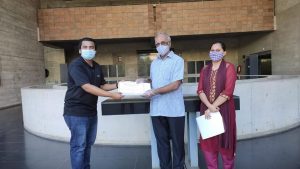 |
Rohingya Research
Overview:
After the reported influx of the persecuted Rohingya people into the territory of Bangladesh on 25th August, 2017, the Centre for the Study of Genocide & Justice (CSGJ) of the Liberation War Museum visited the makeshift camps located in Ukhiya, Cox‟s Bazar. The CSGJ team visited the camps for six times from October 2017 till July 2019. In conducting the research, the CSGJ team participated in pre-field visit workshops conducted by institutes and experts such as UNDP, NHRC and other reputed individuals. The method of collecting oral testimonies was qualitative in nature and was conducted obliging questionnaires, consent forms, non-disclosure agreements. The primary data was collected from the victims and eye-witnesses and survivors through an in-depth interview method by obtaining informed consent of the victims. In addition, the findings of the research was recorded and later transcribed by the CSGJ team.
Out of these six visits, each comprising of different themes and focus. They are as follows-
• The first field visit was conducted on 13th -15th of October 2017, immediately after the influx in August 2017. The makeshifts camps were located in Ukhiyain the district of Cox‟s Bazar, by the land border between Myanmar and Bangladesh. Due to monsoon and the sudden influx of over 1 million forcibly displaced Rohingya people, the conditions of the camps and the location itself was a challenge to overcome. The CSGJ team continued the process of collecting testimonies and collected 67 testimonies in this visit. The makeshift nature of the camp and the instability within the houses called for spontaneous decision of collecting testimonies of victims irrespective of their age and gender. The aim of the CSGJ team in this visit was to reach out to international and national community regarding the atrocities committed by the State of Myanmar on the Rohingya people. In an attempt to let the world know about the extent of the Rohingya tragedy and stories of great human suffering, a total of 24 oral testimonies was selected and published by the CSGJ in November 2017 titled „The Testimony of Sixty on the Crisis of Rohingyas in Myanmar‟ as a sequel to „The Testimony of Sixty on the Crisis in Bengal‟ which was published by OXFAM in a similar humanitarian crisis back in 1971.
• The second field visit was conducted in collaboration with the National Human Rights Commission (NHRC), Bangladesh from February 1-4, 2018 in order to collect the testimonies of victims or eye-witnesses of sexual violence by the Myanmar military. A group of 11 researchers, one counseling expert from the United Nations Development Programme, and 4 interpreters from the CSGJ contributed their assistance in conducting this visit. A total of 53 testimonies were collected adopting the same methodology as the first visit, however, importance to ethical standard and guidelines were emphasized in this visit due to the sensitivity of the victims and eye-witnesses of rape and sexual violence. Finding of this visit reflected the use of sexual violence in addition to the mass killing, arson etc. as a means to forcibly displace the Rohingya people from Myanmar. The CSGJ team compiled the findings in light of the International Humanitarian Law in its publication titled “The Rohingya Genocide-Compilation and analysis of survivors‟ testimonies collected by the CSGJ Research Team”.
• The third field visit was conducted from April 30 to May 2, 2018 and the visit was based on collecting testimonies of victims of sexual violence of Rohingya People where 10 researchers, two counseling expert, 03 interpreters contributed their assistance in this testimony collection team. The teams visited Kutupalong, Balukhali, Hakimpara, Ghumdhum refugee camps to collect primary data which was collected directly from the victims and witnesses through an in-depth interview method. In addition, the findings of the research was recorded and written with the prior consent of the interviewee. The lead interviewer and note taker were chosen amongst female researchers and male researchers worked as verifiers. The report is written after verifying the records in the recorder and with the assistance of notes which were taken by note takers. In total 41 interviews were taken.
• The fourth visit was conducted on 17th to 20th October 2018. This time the research team of CSGJ wanted to talk with the Rohingya survivors to explore how they recount the memories of atrocities they faced in Northern Rakhine State during 2017 and how they are now coping with life in the camps. In particular, the visit intends to find out the social relationship the Rohingya survivors had with other ethnic groups and neighborhood before 2017. There are some other points also covered by the fourth visit such as, the cultural and traditional identity, engagement of Rohingya youth in camp activities, the sense of peace and communal harmony etc. Rather than the quantity the visit had focused on the depth and quality of the narratives collected from different camps.
• The fifth visit was conducted on 1st March to 6th March 2019. In 2019, Asia Rights and Justice (AJAR), Indonesia and the Center for the Study of Genocide and Justice of Liberation War Museum aimd to empower the Rohingya victims to ensure that they can participate and contribute to steps to fulfill their rights, including access to justice. As part of the holistic approach, AJAR and the CSGJ conducted an ‘Exploratory Trip ‘on March, 2019 as part of a project entitled as ‘Pilot Project’. The project aimed to heal, build solidarity and peer support among women survivors. In this field visit, the CSGJ research team was looking for the women participants who were interested to educate them about their rights, build solidarity between survivors and work together to strengthen human rights.
• The sixth visit to Rohhingya camps was conducted on 20th -21th July 2019. By this short visit CSGJ decided to get back to the persons they have interviewed throughout the previous visits. As part of the follow up visit the research team searched for the persons interviewed preciously and reported the current situation of them. The research team of CSGJ also focused on the issue of women empowerment, education facilities, art and crafts, sources of livelihood, expectations and demands from the Rohingya community in the sixth visit.
Memorialization initiatives in the aftermath of Bangladesh genocide:
A focus on Jamalpur & Sherpur district
Starting from February 2021, the project is funded by the Swiss Embassy, Transitional Justice Asia Network (TJAN), Asia Justice and Rights and coordinated by the Center for the Study of Genocide and Justice, Liberation War Museum.
The purposes of this research are as follows:
a) To give brief idea on the specific crimes and incidents occurred in Jamalpur and Sherpur districts between March to December 1971.
b) To focus on case studies of surviving victims of liberation war, battle fields, killing fields.
c) To understand sacrifice of the victims and their trauma, recognition, acceptability in society and make recommendations for their effective memorialization processes.
d) To trace out the unidentified mass graves and torture camps in both the districts and negotiate with the respective District Magistrates in order to preserve and memorialize those sites through government initiatives.
Methodology:
Qualitative in nature. The secondary sources (books, journal articles, local newspapers, administrative documents) as well as taking interviews in the field to extract information will be regarded as the method for the research.
Researchers:
The research has been coordinated by Naureen Rahim, Coordinator, Center for the Study of Genocide and Justice. The team is organized by Hasan Mahmud Ayon, Programme Assistant, CSGJ. The researchers include- Luthfunnahar Shancyi (LLM, Southeast University), Jarin Tasnim Urbi (LLM Candidate, Jagannath University), Sharjin Jahan Fia and Foysal Shahriar Ratul (Students of Law and Justice, Jahangirnagar University).
Topography of Bangladesh Genocide
The four-month long research project started in May 2018, with a number of four student researchers worked under the supervision of the lead author, Naureen Rahim, Coordinator of the Center for the Study of Genocide and Justice. The research defines the terms, Genocide, War Crimes and Crimes against Humanity with the explanation of the Genocide Convention, then, gives a brief historical background of Bangladesh genocide. Some other topics of the proposed book include the Operation Search Light by explaining politicized, the rationale and incidents occurred during operation searchlight byanalyzingthe role of the local collaborators, Shanti Committee, the Pakistan Army; mass killing, mass graves, intellectual killing, sexual violence and other offences and their legal explanations. Lastly, the reasonings behind general amnesty, rehabilitation of the rape victims and their recognition, the disputed status of the Biharis, the role of civil society and Gonoadalat, establishment of the International Crimes Tribunals, Bangladesh etc. have been added in the research draft.
The student researchers of this project include- PretheeMajbahin (MSS, Department of Criminology, University of Dhaka), SamimaNasrin Santa (LLM, BUBT), SaimaSiddiqua and SujanaSabrin (LLM, Bangladesh University of Professionals) and SharjinJahanFia (LLM, Jahangirnagar University).
Dhamrai During 1971: Atrocities, Legal Aspects & Survival
In commemorating the supreme sacrifice of the victims of Bangladesh genocide during 1971, CSGJ initiated an extensive research project on Dhamrai atrocities in 2016. Dhamrai is situated in the outskirts of Dhaka, the capital of Bangladesh. Eight participants of 2nd Winter School participated in that four month long research project.During a community field visit of 2ndwinter school, the researchers came to know that international crimes such as rape, genocide, murder, arson, looting, property grabbing, and enforced conversion of religion took place there in 1971. However, due to time constraints it was not possible for the researchers to come up with detailed accounts of each freedom fighters and Beerangonas. Even it was not possible to cross check the collected information with relevant sources. In this context, this research work intends to survey – using a set of questionnaire – about the present situation of freedom fighters, Beerangonas or collaborators in Dhamrai. Based on the survey, the research study proposes the roles of new generation and government towards them.
The purposes of this research were as followed:
1. To find out whether there were collaborators in the Dhamrai area and the crimes they have committed; their present position in the society and reasons for still not being prosecuted.
2. To focus on case studies regarding surviving victims of liberation war and freedom fighters.
3. Giving emphasis on the destroyed cultural monuments/property of that area.
4. To find out whether there is any Beerangona(s) in the research area and their trauma, recognition, acceptability in the society and make recommendations for their effective reparation and rehabilitation in the society.
Researchers:
Naureen Rahim (Coordinator, Center for the Study of Genocide and Justice and Adjunct Lecturer, School of Liberal Arts and Social Sciences, Independent University Bangladesh), FarhanaYasminMoury (Advocate, Dhaka Judge Court), GolamKibriaSourav (Advocate, Dhaka Judge Court),
IftekharSahariar (Assistant Judge at Bangladesh Judicial Service),
JubaidaSakin(Teaching fellow at Teach for Bangladesh),
NasrinAkter (Program Assistant at Asia Justice and Rights (AJAR)),
SudiptaSankerBiswas (Serving at the Bangladesh Police),
SuraiyaAkterMaha (LLM from East West University and LLB (Hons) from Southeast University).

